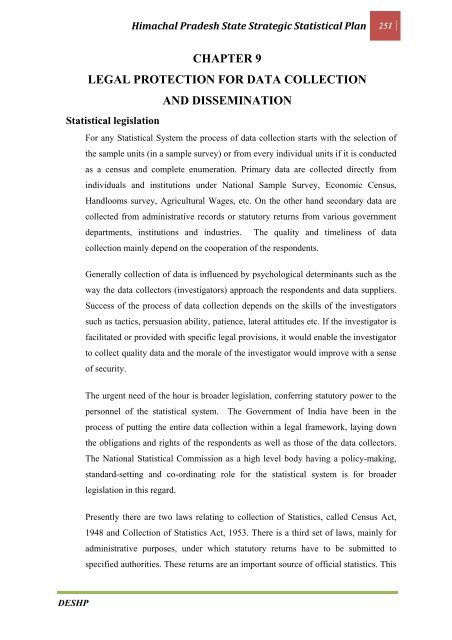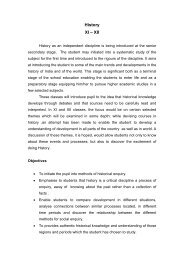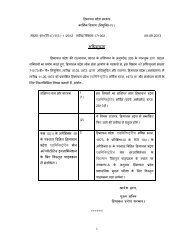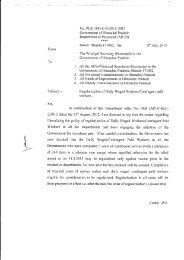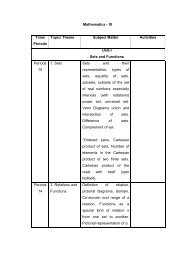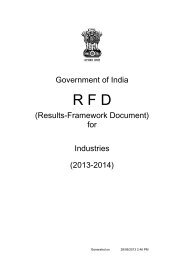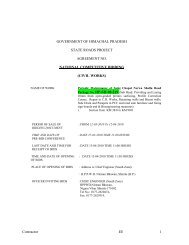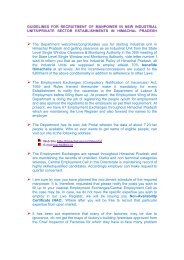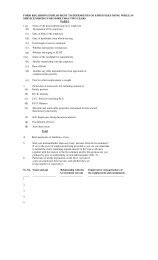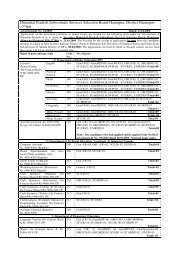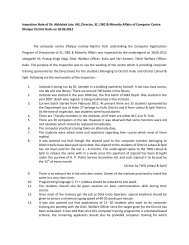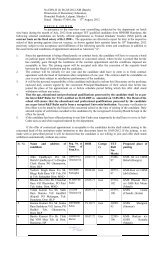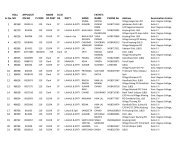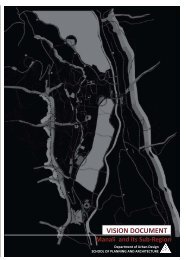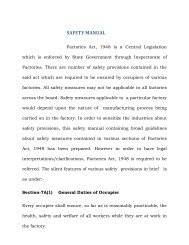- Page 1 and 2:
DESHP Himachal Pradesh State Strate
- Page 3 and 4:
DESHP Himachal Pradesh State Strate
- Page 5 and 6:
DESHP Himachal Pradesh State Strate
- Page 7 and 8:
1.4 State of Economy 1.4.1 State In
- Page 9 and 10:
DESHP Himachal Pradesh State Strate
- Page 11 and 12:
DESHP Himachal Pradesh State Strate
- Page 13 and 14:
DESHP Himachal Pradesh State Strate
- Page 15 and 16:
DESHP Himachal Pradesh State Strate
- Page 17 and 18:
DESHP Himachal Pradesh State Strate
- Page 19 and 20:
2.8 Key Functions of DES DESHP Hima
- Page 21 and 22:
DESHP Himachal Pradesh State Strate
- Page 23 and 24:
DESHP Himachal Pradesh State Strate
- Page 25 and 26:
DESHP Himachal Pradesh State Strate
- Page 27 and 28:
DESHP Himachal Pradesh State Strate
- Page 29 and 30:
DESHP Himachal Pradesh State Strate
- Page 31 and 32:
2.14 Manpower DESHP Himachal Prades
- Page 33 and 34:
DESHP Himachal Pradesh State Strate
- Page 35 and 36:
DESHP Himachal Pradesh State Strate
- Page 37 and 38:
DESHP Himachal Pradesh State Strate
- Page 39 and 40:
DESHP Himachal Pradesh State Strate
- Page 41 and 42:
DESHP Himachal Pradesh State Strate
- Page 43 and 44:
DESHP Himachal Pradesh State Strate
- Page 45 and 46:
DESHP Himachal Pradesh State Strate
- Page 47 and 48:
DESHP Himachal Pradesh State Strate
- Page 49 and 50:
DESHP Himachal Pradesh State Strate
- Page 51 and 52:
DESHP Himachal Pradesh State Strate
- Page 53 and 54:
DESHP Himachal Pradesh State Strate
- Page 55 and 56:
DESHP Himachal Pradesh State Strate
- Page 57 and 58:
DESHP Himachal Pradesh State Strate
- Page 59 and 60:
DESHP Himachal Pradesh State Strate
- Page 61 and 62:
DESHP Himachal Pradesh State Strate
- Page 63 and 64:
DESHP Himachal Pradesh State Strate
- Page 65 and 66:
DESHP Himachal Pradesh State Strate
- Page 67 and 68:
DESHP Himachal Pradesh State Strate
- Page 69 and 70:
DESHP Himachal Pradesh State Strate
- Page 71 and 72:
e) Publications DESHP Himachal Prad
- Page 73 and 74:
DESHP Himachal Pradesh State Strate
- Page 75 and 76:
DESHP Himachal Pradesh State Strate
- Page 77 and 78:
DESHP Himachal Pradesh State Strate
- Page 79 and 80:
DESHP Himachal Pradesh State Strate
- Page 81 and 82:
DESHP Himachal Pradesh State Strate
- Page 83 and 84:
DESHP Himachal Pradesh State Strate
- Page 85 and 86:
DESHP Himachal Pradesh State Strate
- Page 87 and 88:
DESHP Himachal Pradesh State Strate
- Page 89 and 90:
DESHP Himachal Pradesh State Strate
- Page 91 and 92:
DESHP Himachal Pradesh State Strate
- Page 93 and 94:
DESHP Himachal Pradesh State Strate
- Page 95 and 96:
DESHP Himachal Pradesh State Strate
- Page 97 and 98:
DESHP Himachal Pradesh State Strate
- Page 99 and 100:
DESHP Himachal Pradesh State Strate
- Page 101 and 102:
DESHP Himachal Pradesh State Strate
- Page 103 and 104:
DESHP Himachal Pradesh State Strate
- Page 105 and 106:
DESHP Himachal Pradesh State Strate
- Page 107 and 108:
DESHP Himachal Pradesh State Strate
- Page 109 and 110:
DESHP Himachal Pradesh State Strate
- Page 111 and 112:
DESHP Himachal Pradesh State Strate
- Page 113 and 114:
DESHP Himachal Pradesh State Strate
- Page 115 and 116:
DESHP Himachal Pradesh State Strate
- Page 117 and 118:
Sl. No DESHP Himachal Pradesh State
- Page 119 and 120:
DESHP Himachal Pradesh State Strate
- Page 121 and 122:
DESHP Himachal Pradesh State Strate
- Page 123 and 124:
DESHP Himachal Pradesh State Strate
- Page 125 and 126:
DESHP Himachal Pradesh State Strate
- Page 127 and 128:
DESHP Himachal Pradesh State Strate
- Page 129 and 130:
DESHP Himachal Pradesh State Strate
- Page 131 and 132:
DESHP Himachal Pradesh State Strate
- Page 133 and 134:
DESHP Himachal Pradesh State Strate
- Page 135 and 136:
DESHP Himachal Pradesh State Strate
- Page 137 and 138:
DESHP Himachal Pradesh State Strate
- Page 139 and 140:
DESHP Himachal Pradesh State Strate
- Page 141 and 142:
DESHP Himachal Pradesh State Strate
- Page 143 and 144:
DESHP Himachal Pradesh State Strate
- Page 145 and 146:
DESHP Himachal Pradesh State Strate
- Page 147 and 148:
DESHP Himachal Pradesh State Strate
- Page 149 and 150:
DESHP Himachal Pradesh State Strate
- Page 151 and 152:
DESHP Himachal Pradesh State Strate
- Page 153 and 154:
DESHP Himachal Pradesh State Strate
- Page 155 and 156:
DESHP Himachal Pradesh State Strate
- Page 157 and 158:
DESHP Himachal Pradesh State Strate
- Page 159 and 160:
DESHP Himachal Pradesh State Strate
- Page 161 and 162:
DESHP Himachal Pradesh State Strate
- Page 163 and 164:
DESHP Himachal Pradesh State Strate
- Page 165 and 166:
DESHP Himachal Pradesh State Strate
- Page 167 and 168:
DESHP Himachal Pradesh State Strate
- Page 169 and 170:
DESHP Himachal Pradesh State Strate
- Page 171 and 172:
6.16 Forest Department DESHP Himach
- Page 173 and 174:
DESHP Himachal Pradesh State Strate
- Page 175 and 176:
DESHP Himachal Pradesh State Strate
- Page 177 and 178:
DESHP Himachal Pradesh State Strate
- Page 179 and 180:
DESHP Himachal Pradesh State Strate
- Page 181 and 182:
DESHP Himachal Pradesh State Strate
- Page 183 and 184:
DESHP Himachal Pradesh State Strate
- Page 185 and 186:
DESHP Himachal Pradesh State Strate
- Page 187 and 188:
DESHP Himachal Pradesh State Strate
- Page 189 and 190:
DESHP Himachal Pradesh State Strate
- Page 191 and 192:
DESHP Himachal Pradesh State Strate
- Page 193 and 194:
DESHP Himachal Pradesh State Strate
- Page 195 and 196:
DESHP Himachal Pradesh State Strate
- Page 197 and 198:
DESHP Himachal Pradesh State Strate
- Page 199 and 200: 4. Vehicles: DESHP Himachal Pradesh
- Page 201 and 202: DESHP Himachal Pradesh State Strate
- Page 203 and 204: DESHP Himachal Pradesh State Strate
- Page 205 and 206: DESHP Himachal Pradesh State Strate
- Page 207 and 208: DESHP Himachal Pradesh State Strate
- Page 209 and 210: DESHP Himachal Pradesh State Strate
- Page 211 and 212: DESHP Himachal Pradesh State Strate
- Page 213 and 214: DESHP Himachal Pradesh State Strate
- Page 215 and 216: DESHP Himachal Pradesh State Strate
- Page 217 and 218: DESHP Himachal Pradesh State Strate
- Page 219 and 220: DESHP Himachal Pradesh State Strate
- Page 221 and 222: DESHP Himachal Pradesh State Strate
- Page 223 and 224: DESHP Himachal Pradesh State Strate
- Page 225 and 226: 6.38 Provisions for Manpower: DESHP
- Page 227 and 228: DESHP Himachal Pradesh State Strate
- Page 229 and 230: DESHP Himachal Pradesh State Strate
- Page 231 and 232: DESHP Himachal Pradesh State Strate
- Page 233 and 234: DESHP Himachal Pradesh State Strate
- Page 235 and 236: DESHP Himachal Pradesh State Strate
- Page 237 and 238: DESHP Himachal Pradesh State Strate
- Page 239 and 240: DESHP Himachal Pradesh State Strate
- Page 241 and 242: DESHP Himachal Pradesh State Strate
- Page 243 and 244: DESHP Himachal Pradesh State Strate
- Page 245 and 246: DESHP Himachal Pradesh State Strate
- Page 247 and 248: DESHP Himachal Pradesh State Strate
- Page 249: DESHP Himachal Pradesh State Strate
- Page 253 and 254: DESHP Himachal Pradesh State Strate
- Page 255 and 256: DESHP Himachal Pradesh State Strate
- Page 257 and 258: DESHP Himachal Pradesh State Strate
- Page 259 and 260: DESHP Himachal Pradesh State Strate
- Page 261 and 262: DESHP Himachal Pradesh State Strate
- Page 263 and 264: DESHP Himachal Pradesh State Strate
- Page 265 and 266: DESHP Himachal Pradesh State Strate
- Page 267 and 268: DESHP Himachal Pradesh State Strate
- Page 269 and 270: DESHP Himachal Pradesh State Strate
- Page 271 and 272: DESHP Himachal Pradesh State Strate
- Page 273 and 274: DESHP Himachal Pradesh State Strate
- Page 275 and 276: DESHP Himachal Pradesh State Strate
- Page 277 and 278: DESHP Himachal Pradesh State Strate
- Page 279 and 280: DESHP Himachal Pradesh State Strate
- Page 281 and 282: S. N. Activity units DESHP Activity
- Page 283 and 284: S.N. Activity units DESHP Activity
- Page 285 and 286: S.N. Activity units DESHP Activity
- Page 287 and 288: S.N. Activity units DESHP Activity
- Page 289 and 290: DESHP Activity wise & Year wise Imp
- Page 291 and 292: S.N. Activity units DESHP Activity
- Page 293 and 294: DESHP Activity wise & Year wise Imp
- Page 295 and 296: S.N. Activity units DESHP Activity
- Page 297 and 298: S.N. Activity units DESHP Activity
- Page 299 and 300: S.N. Activity units DESHP Himachal
- Page 301 and 302:
S.N. Activity units DESHP Total Bas
- Page 303 and 304:
S.N. Activity units DESHP Total Bas
- Page 305 and 306:
DESHP Particulars 1. Improving the


